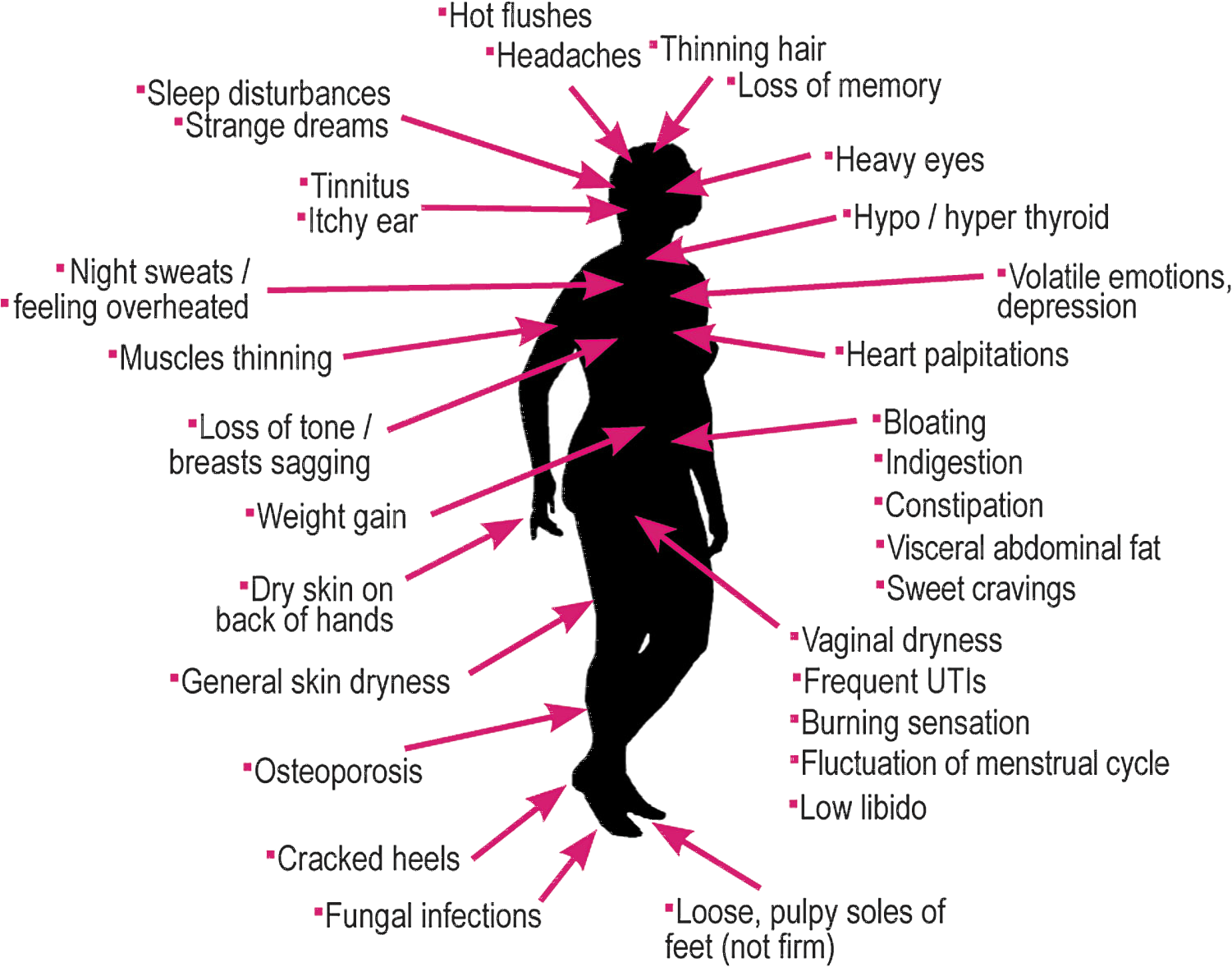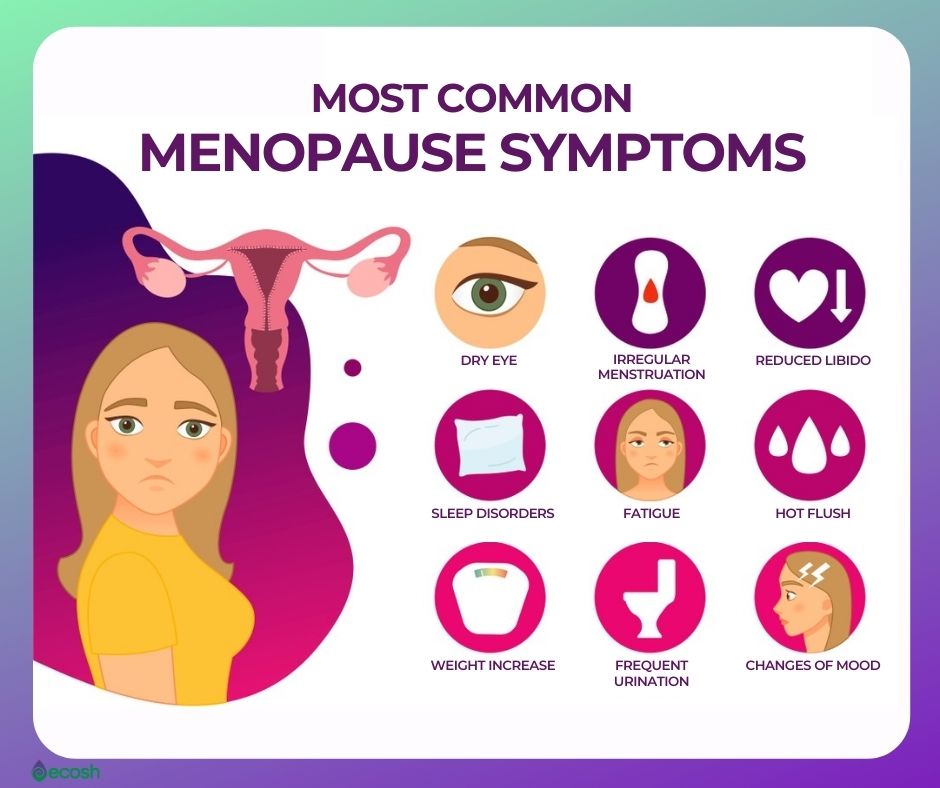First symptoms of menopause – As women navigate the transition into menopause, understanding the first symptoms is crucial. This article provides a comprehensive overview of the early signs of menopause, empowering individuals to recognize and manage these changes effectively.
Menopause, the natural cessation of menstrual periods, is a significant milestone in a woman’s life. While it can be accompanied by various physical and emotional symptoms, recognizing the early signs can help women prepare for and mitigate their impact.
Identifying Common Early Menopausal Symptoms

The onset of menopause is a gradual process that typically begins several years before a woman’s last menstrual period. During this transitional phase, known as perimenopause, women may experience a range of symptoms as their hormone levels fluctuate.
Some of the most commonly reported initial symptoms of menopause include:
Hot Flashes and Night Sweats
- Hot flashes are sudden feelings of intense heat that spread over the face, neck, and chest. They are often accompanied by sweating, flushing, and a rapid heartbeat.
- Night sweats are similar to hot flashes, but they occur during sleep and can cause women to wake up drenched in sweat.
Sleep Disturbances, First symptoms of menopause
- Menopause can disrupt sleep patterns, making it difficult to fall asleep, stay asleep, or get restful sleep.
- This can be caused by hot flashes, night sweats, or hormonal changes that affect mood and energy levels.
Mood Swings
- Menopause can cause mood swings, irritability, and emotional sensitivity.
- These changes are often attributed to hormonal fluctuations that affect the brain’s neurotransmitters.
Vaginal Dryness
- Decreasing estrogen levels can cause vaginal dryness, which can lead to discomfort during intercourse and an increased risk of vaginal infections.
- This can be managed with lubricants or vaginal moisturizers.
Changes in Menstrual Patterns
- As menopause approaches, menstrual periods may become irregular, heavier, or lighter.
- Eventually, periods will stop altogether, marking the onset of menopause.
It’s important to note that not all women experience the same symptoms or to the same degree. Some women may have only mild symptoms, while others may have more severe symptoms that impact their daily lives.
Impact of Menopause on Physical and Emotional Well-being

Menopause is a natural transition that brings about significant changes in a woman’s physical and emotional health. Understanding these changes and their potential impact can help women navigate this transition smoothly and effectively.
Physically, menopause can lead to a range of symptoms, including bone loss, weight gain, and cardiovascular changes. These changes are primarily due to the decline in estrogen production, which plays a crucial role in maintaining bone density, regulating metabolism, and protecting against heart disease.
Bone Loss
Estrogen is essential for maintaining bone health. As estrogen levels decline during menopause, bone density decreases, increasing the risk of osteoporosis and fractures. Regular weight-bearing exercise, adequate calcium intake, and vitamin D supplementation can help maintain bone strength.
Weight Gain
Menopause can also lead to weight gain due to hormonal changes and decreased metabolism. To manage weight gain, women should focus on maintaining a healthy diet, engaging in regular physical activity, and getting adequate sleep.
Cardiovascular Changes
Estrogen has protective effects on the cardiovascular system. With its decline during menopause, women may experience an increased risk of heart disease. Regular exercise, a heart-healthy diet, and managing other risk factors such as high blood pressure and cholesterol can help reduce this risk.
Emotionally, menopause can also bring about challenges, including mood swings, anxiety, and depression. These symptoms are often linked to hormonal fluctuations and the psychological adjustments associated with this transition.
Mood Swings
Mood swings are a common symptom of menopause. They can range from mild irritability to severe emotional outbursts. These swings are often related to changes in estrogen and progesterone levels.
Anxiety
Anxiety is another common emotional challenge during menopause. Women may experience increased worry, restlessness, and difficulty concentrating. These symptoms can be managed through stress-reducing techniques, such as exercise, yoga, or meditation.
Depression
Depression is a more severe emotional symptom that can occur during menopause. It is characterized by persistent sadness, loss of interest in activities, and feelings of worthlessness. If you experience these symptoms, it is essential to seek professional help.
It is important for women to be aware of the potential physical and emotional effects of menopause and to seek support during this transition. Self-care practices, such as maintaining a healthy lifestyle, managing stress, and getting enough sleep, can help alleviate symptoms and improve overall well-being.
Lifestyle Modifications to Manage Menopausal Symptoms

Managing menopausal symptoms requires a holistic approach that incorporates lifestyle modifications. These changes can significantly alleviate the physical and emotional challenges associated with menopause.
Adopting a healthy lifestyle is crucial for overall well-being during menopause. Regular exercise, a balanced diet, and stress-reducing techniques can effectively manage symptoms and improve quality of life.
Exercise
- Engage in moderate-intensity exercise for at least 150 minutes per week.
- Include a combination of aerobic activities (e.g., walking, swimming) and strength training.
- Exercise helps reduce hot flashes, improve mood, and strengthen bones.
Diet
- Consume a balanced diet rich in fruits, vegetables, and whole grains.
- Limit processed foods, sugary drinks, and unhealthy fats.
- A healthy diet provides essential nutrients, supports weight management, and reduces inflammation.
Stress Management
- Practice stress-reducing techniques such as yoga, meditation, or deep breathing exercises.
- Engage in activities that bring joy and relaxation.
- Stress management helps regulate mood, reduce anxiety, and improve sleep.
Complementary Therapies
In addition to lifestyle modifications, complementary therapies may provide additional support in managing menopausal symptoms.
- Yoga and acupuncture have been shown to reduce hot flashes and improve sleep.
- Herbal remedies, such as black cohosh and red clover, may help alleviate menopausal symptoms, but consult with a healthcare professional before use.
When to Seek Medical Attention
While many menopausal symptoms are common and can be managed with lifestyle modifications, it is important to seek medical attention if you experience certain warning signs that may indicate an underlying medical condition.
These warning signs include:
- Sudden or severe hot flashes or night sweats
- Vaginal bleeding after menopause
- Painful or irregular periods
- Heavy or prolonged menstrual bleeding
- Pelvic pain or pressure
- Urinary incontinence or frequent urinary tract infections
- Mood swings, depression, or anxiety that is severe or persistent
- Cognitive changes, such as memory loss or difficulty concentrating
- Skin changes, such as rashes or dryness
li>Joint pain or stiffness
If you experience any of these warning signs, it is important to consult a healthcare professional to rule out any underlying medical conditions. Your doctor may recommend diagnostic tests, such as blood tests, pelvic exams, or imaging studies, to determine the cause of your symptoms.
Treatment for menopause-related issues will depend on the underlying cause and the severity of your symptoms. Your doctor may recommend hormone replacement therapy (HRT), lifestyle modifications, or other medications to manage your symptoms and improve your quality of life.
FAQ Insights: First Symptoms Of Menopause
What are the most common early symptoms of menopause?
Hot flashes, night sweats, and sleep disturbances are among the most frequently reported initial symptoms.
How do hormonal changes contribute to menopausal symptoms?
The decline in estrogen and progesterone levels during menopause disrupts the regulation of various bodily functions, leading to symptoms such as hot flashes, mood swings, and vaginal dryness.
When should I seek medical attention for menopausal symptoms?
If symptoms are severe or persistent, or if you experience any unusual or concerning symptoms, it’s important to consult a healthcare professional.